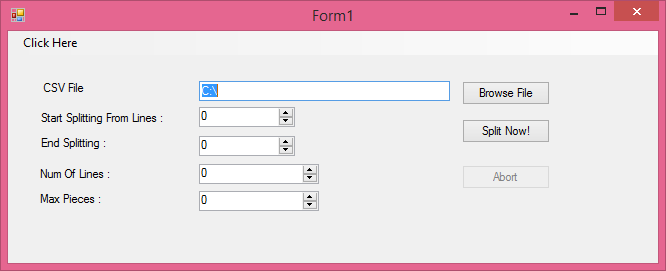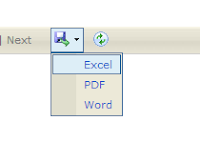CSV Splitter example in C#
Hye guys, this is a example of CSV Splitter created from C# language. Since i dont have enough time to explained each code, so i just copy the code here and feel free to ask me in the comment.
Basically this example will split huge .csv file into several file. So that you can open the csv file faster rather than open the huge one.
By Mohd Zulkamal NOTE : – If You have Found this post Helpful, I will appreciate if you can Share it on Facebook, Twitter and Other Social Media Sites. Thanks =)
Basically this example will split huge .csv file into several file. So that you can open the csv file faster rather than open the huge one.
The Code
using System;
using System.Collections.Generic;
using System.ComponentModel;
using System.Data;
using System.Drawing;
using System.Linq;
using System.Text;
using System.Windows.Forms;
using Microsoft.VisualBasic;
using System.Collections;
using System.Diagnostics;
using System.IO;
using System.Threading;
namespace CSV_Splitter
{
public partial class Form1 : Form
{
public Form1()
{
InitializeComponent();
}
public delegate void UpdateProgressSub(int CurrentLine);
private bool _IsAbort;
public void SplitCSV(string FilePath,int lineStart, int lineEnd, int LineCount, int MaxOutputFile, UpdateProgressSub Status, ref bool IsAbort)
{
// Validate first
if (LineCount < 100)
throw new Exception("Number of lines must be more than 100.");
// Open the csv file for reading
System.IO.StreamReader Reader = new System.IO.StreamReader(FilePath);
// Create the output directory
string OutputFolder = FilePath + "_Pieces";
if (Directory.Exists(FilePath) == false)
{
Directory.CreateDirectory(OutputFolder);
}
// Read the csv column's header
string strHeader = Reader.ReadLine();
// Start splitting
int FileIndex = 0;
do
{
// Update progress
FileIndex += 1;
if ((Status != null))
{
Status.Invoke((FileIndex - 1) * LineCount);
}
// Check if the number of splitted files doesn't exceed the limit
if ((MaxOutputFile < FileIndex) && (MaxOutputFile > 0))
break; // TODO: might not be correct. Was : Exit Do
// Create new file to store a piece of the csv file
string PiecePath = OutputFolder + "\\" + Path.GetFileNameWithoutExtension(FilePath) + "_" + FileIndex + Path.GetExtension(FilePath);
StreamWriter Writer = new StreamWriter(PiecePath, false);
Writer.AutoFlush = false;
Writer.WriteLine(strHeader);
// Read and writes precise number of rows
for (int i = 1; i <= LineCount; i++)
{
string s = Reader.ReadLine();
if (s != null & _IsAbort == false)
{
Writer.WriteLine(s);
}
else
{
Writer.Flush();
Writer.Close();
break; // TODO: might not be correct. Was : Exit Do
}
}
// Flush and close the splitted file
Writer.Flush();
Writer.Close();
} while (true);
Reader.Close();
}
public void UpdateProgress(int CurrentLine)
{
lblStatus.Text = "Aprox. " + CurrentLine.ToString() + " lines splitted";
}
private void Form1_Closing(object sender, System.ComponentModel.CancelEventArgs e)
{
_IsAbort = true;
}
private void saveFileDialog1_FileOk(object sender, CancelEventArgs e)
{
}
private void btnSplit_Click_1(object sender, EventArgs e)
{
System.Threading.Thread th = new System.Threading.Thread(SplitIt);
th.Start();
}
private void btnBrowse_Click_1(object sender, EventArgs e)
{
if (openFileDialog1.ShowDialog() == DialogResult.OK)
{
textBox1.Text = openFileDialog1.FileName;
}
}
private void btnAbort_Click_1(object sender, EventArgs e)
{
_IsAbort = true;
}
public void SplitIt()
{
btnSplit.Enabled = false;
btnAbort.Enabled = true;
try
{
SplitCSV(textBox1.Text,Convert.ToInt32(LinesFrom.Value), Convert.ToInt32(EndLines.Value), Convert.ToInt32(numLinesCount.Value), Convert.ToInt32(numMaxFiles.Value), UpdateProgress, ref _IsAbort);
if (!_IsAbort)
{
Interaction.MsgBox("Completed Successfully!", MsgBoxStyle.Information,"");
}
else
{
_IsAbort = false;
Interaction.MsgBox("Spliting proccess was aborted by user.", MsgBoxStyle.Critical,"");
}
}
catch (Exception ex)
{
Interaction.MsgBox("Unable to split the CSV File. Reason: " + ex.Message, MsgBoxStyle.Critical,"");
}
finally
{
btnSplit.Enabled = true;
btnAbort.Enabled = false;
}
}
private void exitToolStripMenuItem_Click(object sender, EventArgs e)
{
Environment.Exit(0);
}
private void aboutToolStripMenuItem_Click(object sender, EventArgs e)
{
}
}
}
By Mohd Zulkamal NOTE : – If You have Found this post Helpful, I will appreciate if you can Share it on Facebook, Twitter and Other Social Media Sites. Thanks =)


.bmp)
